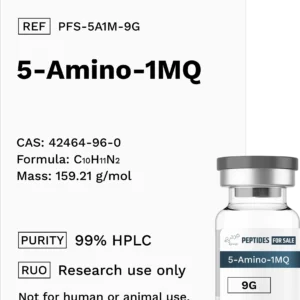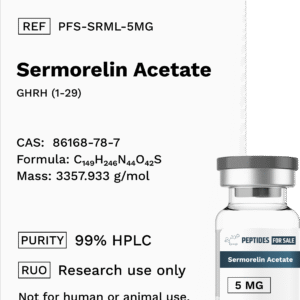AICAR (5-aminoimidazole-4-carboxamide ribonucleotide) is an analog of adenosine monophosphate (AMP) that functions as an activator of AMP-activated protein kinase (AMPK). It is used experimentally to study energy metabolism, glucose uptake, and fatty acid oxidation in cells. AICAR has been investigated for potential therapeutic roles in metabolic disorders, ischemia, and endurance enhancement.
AICAR (5-aminoimidazole-4-carboxamide ribonucleotide) is a synthetic nucleoside analog that has gained significant attention in biomedical and pharmacological research due to its ability to activate AMP-activated protein kinase (AMPK), a central regulator of cellular energy homeostasis. Originally developed for potential use in ischemic conditions, AICAR has since been widely studied for its metabolic, cardiovascular, and performance-enhancing properties. By mimicking the cellular effects of AMP, it stimulates AMPK activity, thereby promoting glucose uptake, enhancing fatty acid oxidation, and improving mitochondrial function. These mechanisms have made AICAR an attractive candidate for managing conditions such as type 2 diabetes, obesity, metabolic syndrome, and ischemic heart disease.
Beyond its clinical applications, AICAR has also been explored in the field of sports science, as it can increase endurance capacity by mimicking some effects of exercise training. However, this aspect has raised ethical concerns regarding its misuse as a performance-enhancing substance, leading to its prohibition by the World Anti-Doping Agency (WADA). Furthermore, research continues to investigate its potential role in oncology, as AMPK activation can influence cell growth and survival pathways relevant to cancer biology. Despite promising preclinical findings, the translation of AICAR into clinical practice remains limited, with challenges related to dosage, bioavailability, and long-term safety still under evaluation. Overall, AICAR represents a pivotal compound in metabolic research, bridging fundamental biochemical pathways with potential therapeutic innovations.
AICAR exerts its effects primarily through activation of the AMP-activated protein kinase (AMPK) pathway, a master regulator of cellular energy homeostasis. Once administered, AICAR is taken up by cells and phosphorylated by adenosine kinase to form ZMP (AICAR monophosphate), which structurally resembles adenosine monophosphate (AMP). This metabolite functions as an AMP analog, binding to the regulatory γ-subunit of AMPK. The binding induces a conformational change that protects AMPK from dephosphorylation while simultaneously promoting its phosphorylation at the critical threonine-172 site by upstream kinases, including LKB1.
Activated AMPK then shifts cellular metabolism towards energy conservation and restoration by enhancing ATP-generating processes while inhibiting ATP-consuming pathways. Specifically, AMPK stimulates glucose uptake by translocating GLUT4 transporters to the cell surface and increases fatty acid oxidation through inhibition of acetyl-CoA carboxylase (ACC), thereby lowering malonyl-CoA levels and promoting mitochondrial β-oxidation. At the same time, it suppresses anabolic processes such as fatty acid, cholesterol, and protein synthesis by downregulating enzymes like HMG-CoA reductase and mTOR signaling.
In ischemic tissues, this mechanism helps preserve energy balance and prevents irreversible cellular damage by optimizing substrate utilization. Additionally, in skeletal muscle, AICAR-induced AMPK activation mimics exercise-related adaptations, improving endurance and mitochondrial biogenesis. Beyond energy metabolism, AMPK activation by AICAR also influences cell proliferation and survival pathways, which has implications for cancer research and neuroprotection.
Thus, AICAR acts as a pharmacological AMPK activator that reprograms metabolic networks, allowing cells to adapt to stress and energy deficiency while offering therapeutic potential in metabolic, cardiovascular, and degenerative diseases.
Sequence: 5-aminoimidazole-4-carboxamide ribonucleoside
Molecular Formula: C₉H₁₅N₄O₈P
Molecular Weight: 338.213 g/mol
PubChem CID: 65110
CAS Number: 3031-94-5
Synonyms: AICA ribonucleotide, Z-nucleotide
Insulin resistance is a hallmark of type 2 diabetes and metabolic syndrome, characterized by impaired glucose uptake and utilization in peripheral tissues. AICAR has been extensively studied as a pharmacological agent capable of modulating metabolic pathways involved in this condition. Experimental findings indicate that AICAR enhances insulin sensitivity by stimulating AMP-activated protein kinase (AMPK), which promotes non-insulin-dependent glucose transport into skeletal muscle and adipose tissue. This bypasses defective insulin signaling and restores glucose balance in resistant states (1).
Rodent studies have demonstrated that AICAR administration improves whole-body glucose disposal and enhances glycogen storage in skeletal muscle (2). In obese and diabetic animal models, chronic AICAR treatment lowered fasting glucose levels, reduced circulating free fatty acids, and improved lipid profiles, outcomes closely associated with reversal of insulin resistance (3). Importantly, AICAR also activates pathways linked to mitochondrial biogenesis and fatty acid oxidation, counteracting the lipid accumulation that contributes to insulin signaling defects (4).
Human studies, though limited, suggest similar trends. Infusion of AICAR in healthy and insulin-resistant subjects increased glucose uptake independent of insulin action, highlighting its therapeutic promise (5). Moreover, AICAR appears to improve endothelial function and vascular insulin sensitivity, which are often compromised in metabolic syndrome (6). While its clinical translation faces challenges related to dosing and safety, preclinical and early human research supports the role of AICAR as a potential intervention for improving insulin responsiveness and preventing metabolic disease progression.
It has emerged as a promising anticancer compound due to its ability to activate AMP-activated protein kinase (AMPK), a central regulator of cellular energy balance. AMPK influences tumorigenesis by modulating metabolism, proliferation, and survival pathways. Sustained activation of AMPK by AICAR has been shown to inhibit tumor cell growth and induce apoptosis in several cancer models (21).
Experimental studies demonstrate that AICAR suppresses cancer cell proliferation by disrupting anabolic metabolism, inhibiting mTOR signaling, and promoting catabolic pathways that deprive tumor cells of necessary biosynthetic substrates (22). In glioma (C6) and prostate cancer cell lines, AICAR treatment significantly inhibited clonal expansion and induced energy stress mediated cell cycle arrest (23). Similarly, in thyroid carcinoma models, AICAR triggered apoptosis through p21 upregulation and caspase-3 activation, indicating a mitochondrial-dependent cell death mechanism (24)
Moreover, combination therapy studies reveal that AICAR enhances the cytotoxic effects of established chemotherapeutics such as doxorubicin and cisplatin. This synergistic effect allows for lower drug doses, potentially minimizing systemic toxicity while maintaining antitumor efficacy (25). In addition, AICAR has shown promise in overcoming drug resistance by sensitizing tumor cells to apoptosis-inducing signals, particularly in chemo-resistant malignancies (26).
These findings underscore AICAR’s therapeutic potential as both a direct metabolic inhibitor of tumor growth and an adjuvant that augments the efficacy of existing cancer treatments. Continued translational and in vivo studies are warranted to determine its safety profile and optimize dosing strategies for clinical application (27).
Inflammation is a central component of many chronic diseases, including metabolic syndrome, atherosclerosis, and neurodegenerative disorders. Research has shown that AICAR exerts notable inflammation-reducing effects, largely through its ability to activate AMP-activated protein kinase (AMPK) and downstream signaling pathways. AMPK activation by AICAR suppresses nuclear factor-κB (NF-κB) activity, a transcription factor that regulates expression of pro-inflammatory cytokines such as TNF-α, IL-1β, and IL-6 (7). By dampening NF-κB–mediated responses, AICAR helps mitigate cellular stress and tissue injury associated with chronic inflammation.
In vascular biology, AICAR has been demonstrated to decrease endothelial inflammation by reducing adhesion molecule expression, thereby limiting leukocyte recruitment to vascular walls (8). This mechanism provides cardiovascular protection and highlights its potential role in the prevention of atherosclerotic plaque progression. Similarly, in adipose tissue, AICAR administration decreases secretion of pro-inflammatory adipokines, which are strongly implicated in insulin resistance and metabolic dysfunction (9).
Neuroinflammatory studies suggest that AICAR-mediated AMPK activation attenuates microglial activation and lowers neurotoxic cytokine release, offering possible therapeutic benefit in conditions like Alzheimer’s disease (10). Additionally, AICAR has been reported to enhance the production of anti-inflammatory mediators such as IL-10, further strengthening its role in immune modulation (11).
Overall, preclinical data strongly support AICAR’s role as an inflammation-modulating agent, with applications spanning cardiovascular, metabolic, and neurological diseases. Although clinical trials remain limited, these findings provide a solid basis for further translational research exploring AICAR as a therapeutic tool in chronic inflammatory disorders.
Cardiovascular diseases remain the leading cause of morbidity and mortality worldwide, with ischemia-reperfusion injury and metabolic dysfunction playing central roles in disease progression. AICAR has been widely investigated for its cardioprotective actions, largely due to its capacity to activate AMP-activated protein kinase (AMPK) and restore energy balance during cardiac stress. Early studies demonstrated that AICAR pretreatment enhances myocardial tolerance to ischemia by improving ATP conservation and promoting substrate utilization in favor of glucose oxidation (12). This metabolic shift provides a more efficient energy source for the heart under hypoxic conditions, thereby limiting cell death and preserving contractile function.
Experimental models also show that AICAR reduces infarct size and improves recovery of left ventricular performance following reperfusion (13). The activation of AMPK by AICAR enhances nitric oxide (NO) bioavailability, contributing to improved coronary blood flow and endothelial function (14). Beyond acute ischemic protection, AICAR has been studied in chronic cardiac remodeling, where it attenuates hypertrophy and fibrosis by suppressing protein synthesis pathways and reducing oxidative stress (15).
In addition, AICAR-mediated signaling influences mitochondrial biogenesis and dynamics, processes essential for sustaining cardiac function during prolonged stress (16). By improving mitochondrial efficiency, AICAR reduces reactive oxygen species (ROS) production, further safeguarding the myocardium against injury. While most evidence arises from preclinical and animal studies, these findings suggest potential therapeutic applications in ischemic heart disease, heart failure, and cardiomyopathies. However, translation into clinical use requires further investigation into safety, dosing, and long-term efficacy.
AICAR has attracted interest in reproductive health due to its role in cellular metabolism and energy regulation. Fertility is tightly linked to metabolic signaling, and studies suggest that AMPK modulation by AICAR may influence both ovarian and testicular functions. Experimental evidence demonstrates that AICAR administration can enhance ovarian responsiveness by improving glucose uptake and mitochondrial activity in granulosa cells, which are crucial for oocyte maturation and follicular growth (17).
In male fertility, AICAR has been shown to regulate spermatogenesis by improving mitochondrial dynamics and reducing oxidative stress in testicular tissue. These effects may preserve sperm quality and motility, which are often compromised in metabolic disorders and oxidative environments (18). Moreover, AICAR’s ability to normalize energy balance in obese or insulin-resistant models indirectly benefits reproductive outcomes, as metabolic dysfunction is a recognized cause of subfertility (19).
Another important aspect is its influence on endometrial receptivity. AMPK activation via AICAR has been linked to better regulation of implantation-associated genes, suggesting a potential role in enhancing uterine environment for embryo implantation (20). Although preclinical studies are promising, clinical investigations remain limited, and safety concerns regarding long-term use in reproductive populations warrant further research.
Xiang X, et al. Therapeutic implications of AMPK activation in metabolic and oncologic diseases. Front Oncol. 2023;13:1169457.
| Weight | 50mg |
|---|



